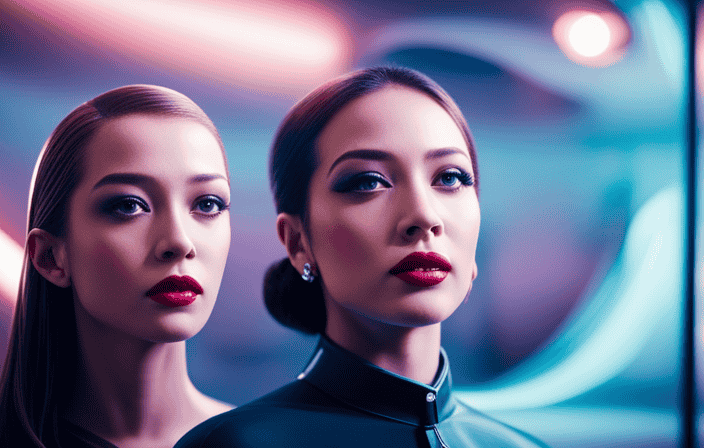The beauty industry is currently undergoing a technological revolution. With continuous advancements in technology, beauty companies are finding new ways to meet the ever-changing needs of customers.
From personalized product recommendations to virtual try-ons, technology has enhanced the customer experience in ways we never thought possible.
With the convenience of online shopping and the power of social media marketing, the beauty industry has seen exponential sales growth.
Join me as we explore the transformative effects of technology on the beauty industry and how it has revolutionized the way we approach beauty.
Key Takeaways
- Heightened beauty consumer demands drive the need for customized and precise beauty products, which can be met through the use of technology.
- Technology enables enhanced customer experiences in the beauty industry, offering convenience and comfort through features such as digitized customer experiences, virtual try-on, and product matching.
- Improved customer communication and marketing strategies are made possible through technology, with features like live chats, chatbots, multichannel communication, and leveraging customer data for effective marketing.
- The beauty industry has experienced exponential sales growth through the use of technology, including reaching clients through social media and websites, utilizing influencers for product marketing, and the rise of online sales, driven by eCommerce technology.
Beauty Industry’s Tech-driven Transformation
I believe that the beauty industry’s tech-driven transformation has revolutionized the way beauty brands meet consumer demands, enhance customer experiences, and communicate and market their products.
Technology has enabled beauty brands to offer customized and precise beauty products, meeting the increasing demands of consumers.
With the digitization of customer experiences, beauty consumers now enjoy convenience and comfort through features like booking appointments conveniently and virtual try-on and product matching.
Improved customer communication and marketing strategies have also been made possible through technology, such as live chats, chatbots, and AI-powered beauty apps.
Additionally, the beauty industry has experienced exponential sales growth by reaching clients through social media and websites, utilizing influencers, and leveraging ecommerce technology.
Overall, technology has brought numerous benefits to the beauty industry, transforming it into a more efficient and personalized sector.
Consumer Demands
With consumer demands evolving at lightning speed, the beauty world is under pressure to keep up and deliver tailored experiences that leave customers feeling like a kid in a candy store.
Technology has become the driving force behind meeting these demands, enabling beauty brands to offer customized and precise products. Through the use of AI and AR, virtual try-on and product matching tools have become a reality, allowing customers to find the perfect beauty products without leaving their homes.
Additionally, technology has enhanced customer communication and marketing strategies. Live chats and chatbots provide quick responses to customer queries, while AI-powered beauty apps analyze customer data to offer personalized recommendations.
Through social media platforms and influencers, beauty brands can reach a wider audience and drive exponential sales growth.
Overall, technology has revolutionized the beauty industry, providing convenience, personalization, and improved customer experiences.
Enhanced Customer Experience
Digitizing the customer experience has revolutionized how beauty consumers can conveniently book appointments, virtually try on products, and find their perfect match using AI and AR technology. With the advancements in technology, beauty brands have been able to provide a more personalized and convenient experience for their customers.
Through virtual try-on and product matching, consumers can experiment with different looks and find the products that suit them best without the need for physical interaction. AI-powered beauty apps analyze customer data and behavior to offer tailored recommendations and suggestions. Additionally, the use of chatbots and live chats ensures improved response times and efficient communication with customers.
This enhanced customer experience not only adds convenience and comfort but also helps beauty brands stay competitive in the rapidly evolving industry.
Improved Communication and Marketing
Leveraging customer data and behavior, AI-powered beauty apps analyze and provide tailored recommendations. These apps use advanced algorithms to analyze individual preferences and offer personalized beauty solutions. By analyzing customer data, they can suggest the right skincare regimen, makeup shades, and even hairstyles.
This level of customization enhances the overall customer experience and increases satisfaction. Additionally, social media platforms play a crucial role in marketing and selling beauty products. Brands can showcase their products through engaging content, collaborate with influencers to reach a wider audience, and provide a seamless shopping experience through integrated e-commerce features.
This combination of AI-powered beauty apps and social media marketing has revolutionized the beauty industry. It allows brands to connect with consumers on a deeper level and drive sales growth.
Exponential Sales Growth
I have witnessed exponential sales growth in the beauty industry through the use of digital platforms and influencer collaborations.
The beauty industry has embraced the power of social media and online sales to reach a wider audience. Platforms like Instagram and YouTube have become powerful marketing tools, allowing brands to showcase their products and connect with potential customers. Influencers play a significant role in driving sales by promoting beauty products to their followers.
Additionally, the convenience of online shopping has contributed to the industry’s growth, especially during the pandemic when social distancing measures were in place. With the click of a button, consumers can browse through a wide range of beauty products and make purchases from the comfort of their own homes.
The beauty industry’s adoption of digital technology and influencer partnerships has undoubtedly fueled its exponential sales growth.
Products Personalization
With the advancement of AI-powered technology, personalized beauty products and services have become more accessible and tailored to individual needs. The beauty industry has embraced this trend and is leveraging technology to offer personalized advice and solutions.
One notable example is L’Oréal’s AI-powered foundation machine, Le Teint Particulier. This innovative technology scans and analyzes the customer’s skin tone to create the perfect foundation shade. By using AI algorithms, it takes into account factors such as undertones and skin variations, resulting in a customized product that matches the customer’s unique complexion.
This level of personalization not only enhances the customer experience but also ensures that they receive a product that meets their specific requirements. Technology is revolutionizing the beauty industry by empowering consumers to have greater control over their beauty routines and enabling brands to deliver products that cater to individual preferences.
Convenience and Social Distancing
Amidst the current landscape, it’s fascinating to witness how technology has seamlessly integrated into our daily lives, offering unparalleled convenience and transforming the way we shop for our favorite beauty products.
With the rise of eCommerce technology, online shopping has become the preferred method for beauty consumers, especially during the pandemic when social distancing is crucial. The beauty industry has adapted to this shift by leveraging digital platforms to reach clients and drive sales.
Additionally, the use of AI-powered solutions has allowed for personalized recommendations and services, from finding the right foundation shade to creating customized skincare routines. This level of convenience not only enhances the customer experience but also helps beauty brands retain their customers.
Technology has undoubtedly played a vital role in making beauty shopping more convenient and accessible, ensuring that consumers can continue to indulge in their favorite products while prioritizing their health and safety.
Brand Reputation and Customer Retention
Moving on from the convenience and social distancing aspect of the beauty industry’s tech-driven transformation, let’s delve into the importance of brand reputation and customer retention.
In today’s competitive landscape, building a strong brand reputation is crucial for beauty companies to thrive. Technology plays a vital role in achieving this goal by enabling effective communication and timely responses to customer queries and concerns.
With the help of multichannel communication platforms, beauty brands can engage with their customers across various touchpoints, ensuring a seamless and personalized experience.
Moreover, leveraging customer data allows companies to tailor marketing strategies and offer targeted promotions, further enhancing customer retention.
Social media platforms like Instagram also play a significant role in brand reputation and selling products.
By utilizing technology to establish and maintain a positive brand image, beauty companies can foster customer loyalty and propel their growth in the ever-evolving industry.
Frequently Asked Questions
How has technology specifically shaped the beauty industry’s transformation?
Technology has shaped the beauty industry’s transformation by meeting consumer demands for personalized products, enhancing the customer experience through digitization, improving communication and marketing strategies, driving exponential sales growth, and enabling the creation of personalized products and services.
What are some examples of AI and AR being used in the beauty industry to enhance the customer experience?
AI and AR are being used in the beauty industry to enhance the customer experience. Examples include virtual try-on and product matching, AI-powered beauty apps analyzing customer data, and L’Oréal’s AI-powered foundation machine, Le Teint Particulier.
How are beauty brands leveraging customer data for effective marketing strategies?
Beauty brands are leveraging customer data for effective marketing strategies by analyzing AI-powered beauty apps, social media platforms, and customer behavior. This data helps create personalized experiences, target specific audiences, and optimize marketing campaigns for maximum impact.
What role do influencers play in the exponential sales growth of the beauty industry?
Influencers play a crucial role in the exponential sales growth of the beauty industry. By promoting and endorsing products through social media platforms, they have the ability to reach a large audience and influence their purchasing decisions.
Can you provide examples of innovative technologies that are driving growth in the beauty industry?
Innovative technologies driving growth in the beauty industry include AI-powered solutions for personalized products, virtual try-on and product matching, live chats and chatbots for improved customer communication, and leveraging customer data for effective marketing strategies.
Conclusion
In conclusion, the beauty industry has undergone a remarkable tech-driven transformation that has revolutionized the way we experience beauty.
With the help of AI, AR, and other technological advancements, beauty brands have been able to meet the evolving demands of consumers, providing personalized products and services.
The convenience and comfort offered through digitization have made the customer experience more enjoyable and accessible.
Online sales have skyrocketed, and social media platforms have become powerful tools for marketing and selling beauty products.
Overall, technology has brought immense benefits to the industry, ensuring its growth and success in the digital age.










